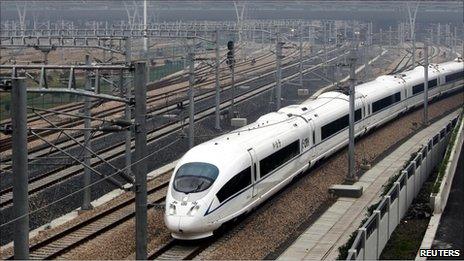China's new industrial revolution
- Published

In its race to provide future growth, the speed at which China is adopting new technologies is breathtaking.
Take one example: high speed rail.
Five years ago, there was not a single kilometre of high speed track in China. Today, it has more than Europe and by 2012, it will have more than the rest of the world put together.
A vast, spotless factory in the port city of Qingdao is in the front line of this new industrial revolution.
It is here that the giant state-controlled train-making company CSR developed a Chinese high-speed train.
China's leaders "played a strong role in making all of this happen", says CSR's chairman, Xiaogang Zhao.
Foreign know-how
China's leaders started by demanding that any foreign company bidding for a part of the massive proposed high-speed programme to share its technology with a Chinese partner.
The Japanese engineering giant Kawasaki accepted this condition. A pioneer of high-speed rail, with almost half a century of development to its name, Kawasaki agreed to share its knowledge with CSR.
Siemens of Germany struck a similar deal with another Chinese train-maker.
With access to foreign know-how secured, the government then provided an army of 10,000 engineers and academics to create a Chinese train, Mr Zhao explains.
They did it, he says, in less than three years.
New train
Inside the Qingdao factory, senior engineer Ding Sansan explains how every aspect of the Japanese train had to be redesigned for the faster 350 kilometres per hour running speed that China's high-speed strategy demanded.
Everyone worked so hard on the project that he can hardly remember his last holiday.
"It was a very big challenge", he says.
And it is just the beginning.
Mr Ding is now working on a new train, due to be tested next year at an astonishing 500 kilometres per hour.
Unacceptable condition
Having acquired the technology, China is already exporting it.
This year, CSR supplanted Siemens as lead contractor on a new 440 kilometre high-speed line in Saudi Arabia.
Outside China, the speed at which such leading-edge technologies are being adopted is causing concern.
But China now plans to go one step further.
Under a new proposal, "indigenous innovation", foreign companies bidding for Chinese government contracts will not only have to share existing know-how.
They will also be required to conduct any new research and development work in China.
For some companies this will prove an unacceptable condition, according to Brenda Foster, head of the American Chamber of Commerce in Shanghai.
"It will keep American companies from being able to compete in the Chinese domestic market," she says.
"For some companies, that could actually put them out of business."
Hindering ideas
While America and China argue over "indigenous innovation", China is taking a new, direct approach - encouraging highly-skilled Chinese-born expatriates to return home from overseas, bringing their ideas and expertise with them.
But some of these experts have found that China's top-down, centrally-controlled culture, so successful in delivering technologies such as high-speed rail, can prove an obstacle to innovation.
Top medical scientist Professor Guosong Liu, moved from America to take up a post at Tsinghua, China's leading scientific university.
There, the memory and intelligence-enhancing drugs he has been developing in the US and Germany are being tested on thousands of rats and mice.
Frightened students
For such meticulous, labour-intensive work, Professor Liu says, China's hierarchical culture is perfect.
But when it comes to innovation, "this culture inhibits the evolution of new ideas", he says.
Professor Liu finds his Chinese students to be very different from their American counterparts.
Where American students are active in the lecture hall and constantly challenge what they are told, Chinese respect for hierarchy and authority means that even at a top university such as Tsinghua, it is hard to generate creative debate, he explains.
"I always say there's no stupid question. Ask me something stupid - it's better than nothing", Professor Liu says.
"But they sit there. Maybe they're scared of me, but they're not challenging me".
Competitive edge
Another top scientific returnee, Professor Shi Yigong, shocked his colleagues at the top US university Princeton by turning down a $10m research grant to become Dean of Life Sciences at Tsinghua.
Professor Shi also believes China's hierarchical, top-down environment stifles creative debate.
"Every time you say something, you have to think whether what I said appeases my superior," he says.
"You begin to limit your innovation. I think you basically have less innovative factors in your mind".
Companies outside China may fear the break-neck speed at which China is adopting leading edge technologies.
But when it comes to new ideas and innovation, Professor Shi says, China's top-down, hierarchical culture means Europe and the US look likely to keep their competitive edge for some time yet.
You can find links to Michael Robinson's radio documentaries on the BBC World Service's documentaries page.